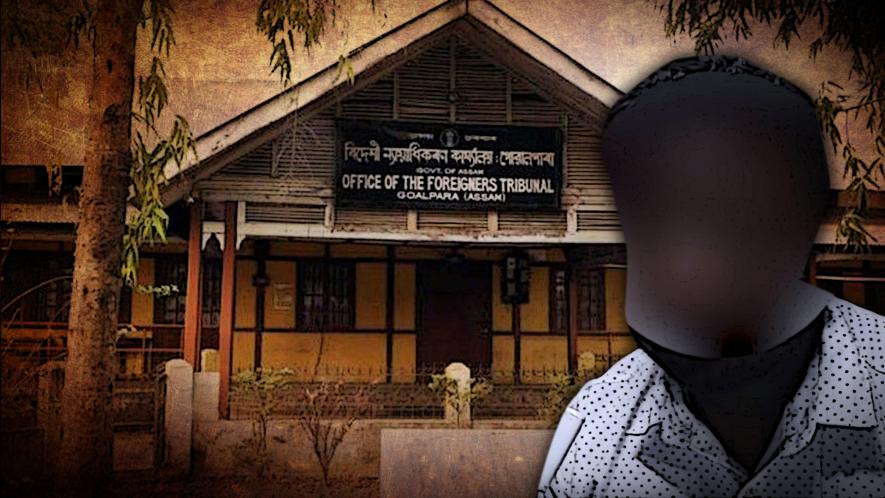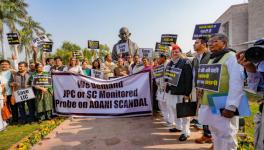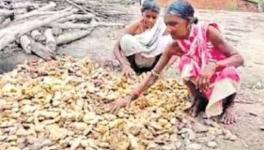Assam: How Citizens Are Being Turned Into ‘Foreigners’

As evening descended on Barpeta-Bongaigaon stretch of National Highway 31 in Assam, a group of desperate men waved down our vehicle. That is how Newsclick chanced upon Bakkar Ali who has been turned into a fugitive without committing any crime, allegedly harassed and hounded, declared a foreigner to be deported. Born and brought up in Assam, Bakkar Ali is in his thirties. He was a teacher in a govt. school, used to vote in elections, as did his parents and led an unremarkable life. But a chain of legal events since 2016 has destroyed his life. For the last many months, he, his brother and his mother have been declared foreigners. They live underground and invisible, fighting an uphill battle for justice and to prove that they are Indians. This chilling story is being repeated hundreds of times across Assam, throwing life into turmoil and creating untold misery.
It all started when the Superintendent of Police (Border) referred a matter to the Foreigners Tribunal No. 1, Bongaigaon, stating that Ali and his family are “foreigners by entering into Assam after March 25, 1971”.
The Border Police and the Foreigners Tribunals (FT) came into existence in 1962 and 1964 respectively. During surveillance, if the Border Police finds anyone's citizenship doubtful, it chargesheets the person and sends the case to the SP (B) concerned who refers the matter to the FT. There are allegations that they randomly pick names to be declared doubtful without any investigation.
Also Watch: Assam’s NRC Mix-Up: Certified Indian Abdul Kaddus’ Ongoing Struggle to Prove Citizenship
There are other ways in which people can end up before the Foreigners’ Tribunal. The Election Commission introduced the D [doubtful]-Voter category in 1997. During revision of electoral rolls, EC-appointed LVOs (Local Verification Officers who generally work on contract basis) can declare a person doubtful. Their report goes to the ERO (Electoral Registration Officer) who sends it to the SP (B) concerned who refers the case to the FT. During preparation of the National Register of Citizens (NRC), a report can be made of person(s) not being able to provide paperwork. This too goes through SP(B) and the person ends up before the FT.
Ali and his family contested the case by filing “valid documents” such as certified copy of the electoral roles of 1966, 1979, 1997, 2005, 2016 and 2018 in which his and other family members are mentioned, his ECI voter’s identity card, copies of admit card and passing certificates of 10th and 12thstandard to prove his date of birth as January 15, 1985. In addition, he also submitted his college documents.
The tribunal in its judgement dated April 16, 2016, citing a Gauhati High Court verdict in Maslem Mandal & others Vs Union of India & others case reported (2010) 3 GLT 393, held that while documents submitted by Omila Bewa (Bakkar’s mother) and Md Abdul Hussain @ Abdul Hussain (Bakkar’s brother) were valid and hence these two were not foreigners, Bakkar Ali’s documents did not establish that he was Indian. So, according to the FT order:
“...I am of the considered opinion that the OPP [Bakkar Ali] is a foreigner in between 1-1-1966 to 25-03-1971 stream, but not deportable. However, the OPP’s names are liable to delete from all the voter lists for a period of 10 (ten) yearsand the opp is required to get his name registered with the appropriate authority within 2 (two) months from this judgement and order. The OPP is specifically directed also to take redress of the required registration with the F.R.R.O. (Foreigner Regional Registration Office), Bongaigaon failing of which the OPP is deportable.”
In the mother’s case, there was her father’s name in the NRC 1951, her own name in the voter’s list of 1979, and a link certificate showing link with her father. In the brother’s case, his grandfather’s listing in NRC 1951 and in the voters list of 1966, his father’s name in the voter’s list of 1979, his own entry in the voters list of 1997 and 2005 along with his father’s, and a school certificate where his date of birth is recorded as 19 Feb 1974.
Also Watch: NRC: Heartless State Throws a Pregnant Woman in Jail in Assam
So what happened to Bakkar Ali’s case? Why is he a foreigner while his brother and mother are not? This is what the FT says:
“...I have carefully perused the documents also relied upon by the OPP [Bakkar Ali], which are Ext – A to Ext – D [Exhibit A to D]. The documents relied upon by the OPP are the voter list of 1966, 1979, 1997 and 2005. ….The voter list of 1966 does not ascertain any particular date which is required prior to 1-1-1966. Hence in absence of such other independent and cogent evidence, the OPP’s case comes within the above mentioned 2nd categories of cases which are in between 1-1-1966 to 25-3-1971 stream”.
As per Section 9 of the Foreigners Act, 1946, the burden of proof lies on the OPP to substantiate that he or she is not a foreigner. Three categories are defined: 1) those who came to India before 1-1-1966 - they are not foreigners; 2) those who came to India after 1-1-1966 and before 25-3-1971 - they are foreigners but not deportable. Their names are deletable from all voter lists for a period of 10 years from the date of judgement and order. They are required to get their names registered with the appropriate authority, who is SP (border) of the area within two months of the order of the tribunal so that they can enjoy the rights as Indian citizens; and 3) those who came to India after 25-3-1971 - they are foreigners and deportable.
When Bakkar approached the FRRO, as directed by the tribunal, the authorities concerned allegedly fudged his documents by changing his year of birth from 1985 to 1970 and his residential address.
“I was asked to sign a form in which my year of birth was mentioned as 1970. The form said I entered Assam’s Vill. No. 2, Patkata, P.S. Manikpur, Dist. Goalpara, from Koraimari village, P.S. Gaibandha, Dist. Rongpur, East Pakistan (now Bangladesh). And now, I reside at Vill. No. 2, Patkata, P.S. Manikpur, Dist. Bongaigaon (Assam). I was asked to give these fudged details only while deposing before the Superintendent of Police and other authorities concerned. When I objected and told them I was born in India in 1985 and have documents to prove it, I was threatened with arrest and detention. Even then I did not sign the paper for three days but at last, I had to bow down,” Bakkar told Newsclick which has reviewed all the documents.
The young man, who was serving as teacher in a government school in the state but was dismissed after he was declared a foreigner, decided to challenge the tribunal’s verdict in the Gauhati High Court, which directed the tribunal to re-hear all the cases (Bakkar’s, his mother’s and his brother’s) together.
In his fresh affidavit filed before the FT, Bakkar said his deceased father Ketu Sheikh was a bonafide voter of 1979 and his grandfather’s name was also recorded in the voter list of 1966. He also stated that his grandfather’s name was recorded in the NRC of 1951. His father also cast his vote in the year of 1997 and the former used his right to franchise in 2005. He again submitted certified copies of voter lists of 1966, 1979, 1997 and 2005, a school certificate, an electoral photo identity card, copy of the NRC of 1951, village panchayat certificate and computer generated NRC of 1951. So, he said, he is not a foreigner but an Indian national.
In its judgement on May 18, 2018, the FT said Bakkar could not produce his birth certificate, PRC (Permanent Residential Certificate), other legal heir certificate and next to kin certificate.
According to the tribunal, Bakkar’s father died in 1999 but there was no death certificate. He failed to say about the death of his grandparents. He – the tribunal said – was unable to mention voter Sl. No., holding no. and polling station no. of his grandparents. The tribunal said though the name of his grandparents is recorded in the NRC (vide legacy data – 1304018920), yet he has not filed legacy data of his grandfather with the affidavit evidence-in-chief. He also denied that he entered into India after March 25, 1971 without any authentic documents.
Therefore, the tribunal rejected the voter list of 1966 in the name of Kamal Seikh, Bakkar’s grandfather but accepted other documents such as certified copy of 1979 voter list in the name of Ketu Sheik and Omila Bibi – Bakkar’s grandparents, voter list of 1997 in the name of Ketu, Abul Hussain and Jaynab Bibi, voter list of 2005 in the name of Abul Hussain – Bakkar’s elder brother, Jaynab Bibi and Md Bakkar Ali.
Bakkar’s elder brother Abdul Hussain told the tribunal that he was born on February 19, 1974 at Patkata and studied in 407 No. Patkata School upto class II. He also deposed that he has no birth certificate, PRC and legal heir and kin certificates. He said in cross examination that he studied up to class II but – the tribunal said – the school certificate he had submitted shows that he read up to class IV and got second division. Hence, the tribunal rejected his school certificate.
As Bakkar, he too failed to say about the death of his grandparents. Though he told the tribunal that his grandmother’s name was Basiran Bibi but he had no certified copy of voter list of her grandmother. The tribunal also rejected the voter list of 1966 in which his grandfather’s name was mentioned because he failed to tell the tribunal the polling station number, house and SI No. of his garndfather. The tribunal went on to reject the computer generated copy of the 1951 NRC in the name of Kamal Uddin Seikh where his age was mentioned as 48 years.
The tribunal said, “...the certified copy of 1966 voter list in the name of Kamal Seikh where his age was mentioned as 50 years, which is quite contradictory and not acceptable”.
Similary, their mother Omila Bewa told the tribunal during cross examination – as per the judgement – that she had no birth certificate, PRC, legal heir and kin certificates. She told the tribunal – according to the judgement – that her father Sahad Ali died about 40-42 years ago but she has not death certificate and certified copy of voter list in her father’s name. The judgement said she stated before the tribunal that her mother died about 25 years ago but she neither had the death certificate nor a voter list of her mother Nur Jahan.
The judgement said she also failed to prove the contents of the copy of 1951 NRC issued by the in-charge of South Salmara, Dhubri district. The court rejected the important document stating that it has “no evidentiary value”.
The tribunal also rejected the link certificate (marriage certificate) she had produced because of an apparent clerical error. The link certificate recorded her date of marriage as July 19, 1974. Rejecting it, the tribunal said, “One of his (her) son Abdul Hussain @ Abul Hussain has his date of birth recorded as February 19, 1974, hence it is quite contradictory …. the date of marriage and the date of birth of her son Abdul Hussain @ Abul Hussain.”
The tribunal further said, “Mere filing of documents or marking of documents as exhibits by a proceedee is not enough. Not only the documents but also the contents thereof would have to be proved and relevancy established as per mandate of Section 9 of the Foreigners Act, 1946 as explained by the Honourable Supreme Court in Sarbananda Sonowal Vs Union of India....”
The tribunal concluded that “...the evidences and the documents filed by the OPPs in support of their versions are found to be not sufficient and trustworthy to prove that they are citizen of India by birth and not foreigner or illegal migrants.... Considering the entire materials on records and the discussions, I am of the considered opinion that the evidences of the OPPs are not trustworthy at all and the OPPs have miserably failed to discharge their burden to prove that they were born through genuine Indian parents and as such acquired citizenship of India by birth. Rather it appears that the OPPs – Bakkar Ali, Abdul Hussain and Omila Bewa entered into India without authority subsequent to 25-03-1971 and hence they are termed to be foreigner/illegal migrant of post 25-03-1971 stream.”
The tribunal ordered the SP (Border), Bongaigaon, to apprehend the three and keep them in detention camp till their deportation in accordance with procedures.
Following the judgement, Bakkar, his brother and his mother are living in hiding, expecting relief from the high court, which he said he will be approaching after the summer vacation ends.
As we said good bye to him, Bakkar disappeared in the darkness. Will Bakkar, his family and many like him ever get justice?
Also Read: Updating the National Register of Citizens (NRC) in Assam and What it Means
Get the latest reports & analysis with people's perspective on Protests, movements & deep analytical videos, discussions of the current affairs in your Telegram app. Subscribe to NewsClick's Telegram channel & get Real-Time updates on stories, as they get published on our website.






















